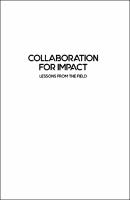Collaboration for Impact
Lessons from the Field
Abstract
Collaboration is often seen as a palliative for the many wicked problems challenging our communities. These problems affect some of the most vulnerable and unempowered people in our community. They also carry significant implications for policy processes, programs of service and, ultimately, the budgets and resourcing of national and sub-national governments. The road to collaboration is paved with good intentions. But, as John Butcher and David Gilchrist reveal, 'good intentions' are not enough to ensure well-designed, effective and sustainable collaborative action. Contemporary policy-makers and policy practitioners agree that ‘wicked’ problems in public policy require collaborative approaches, especially when those problems straddle sectoral, institutional, organisational and jurisdictional boundaries. The authors set out to uncover the core ingredients of good collaboration practice by talking directly to the very people that are engaged in collaborative action. This book applies the insights drawn from conversations with those engaged in collaborations for social purpose—including chief executives, senior managers and frontline workers—to the collaboration challenge. Backed up by an extensive review of the collaboration literature, Butcher and Gilchrist translate their observations into concrete guidance for collaborative practice. The unique value in this book is the authors’ combination of scholarly work with practical suggestions for current and prospective collaborators.
Keywords
Childhood obesity; ANZSOG; Violence women; social policy; rehabilitationDOI
10.22459/CFI.2020Publisher
ANU PressPublisher website
https://press.anu.edu.au/Publication date and place
Canberra, 2020Imprint
ANU PressSeries
Australia and New Zealand School of Government (ANZSOG),Classification
Public administration
Economics


 Download
Download